
AeonLabs-AI-Volvo-MKII-Open-Hardware
Volvo MKII Open Hardware
Stars: 131
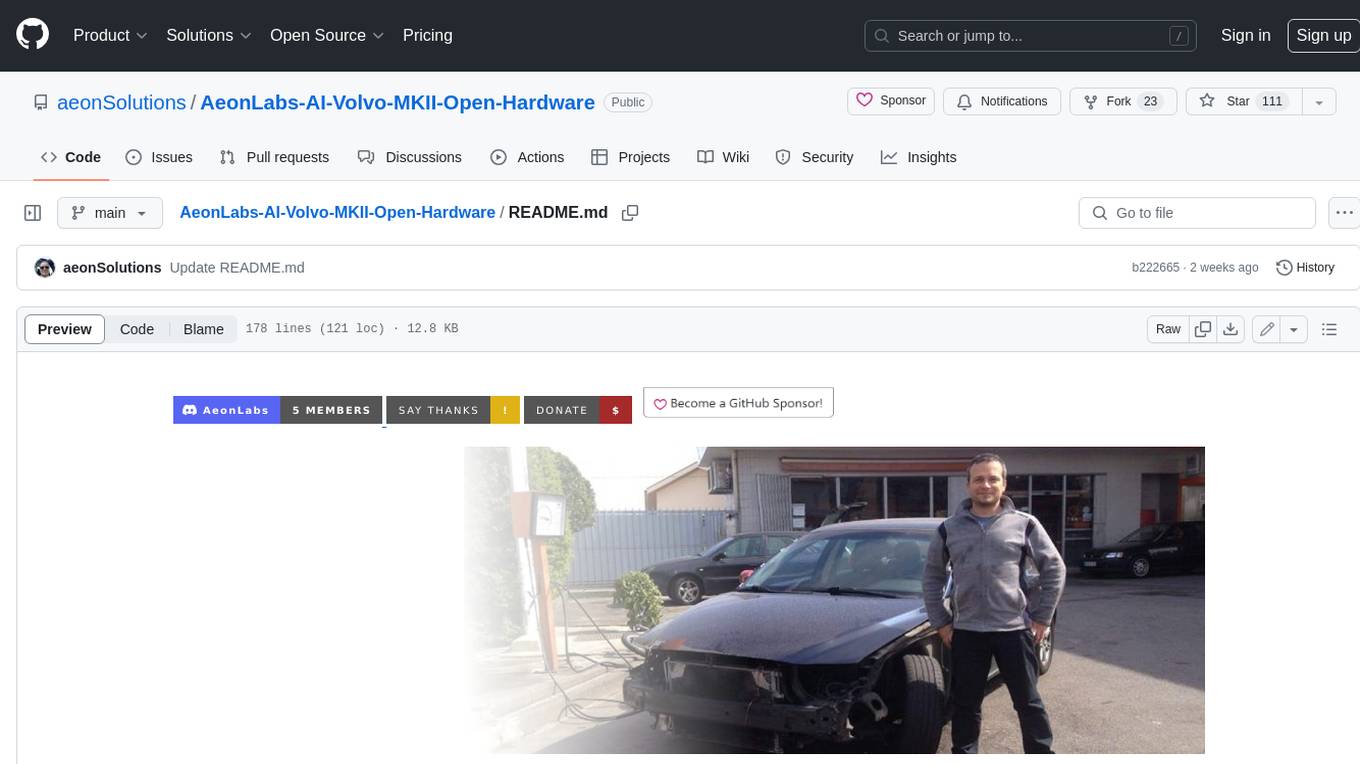
This open hardware project aims to extend the life of Volvo P2 platform vehicles by updating them to current EU safety and emission standards. It involves designing and prototyping OEM hardware electronics that can replace existing electronics in these vehicles, using the existing wiring and without requiring reverse engineering or modifications. The project focuses on serviceability, maintenance, repairability, and personal ownership safety, and explores the advantages of using open solutions compared to conventional hardware electronics solutions.
README:
Navigation | AeonLabs Main Index >> Open Hardware Electronics >> Vehicle Automation >> Volvo P2 Open Hardware
current project Total: > 1350 work.h
Status: Ongoing Project
where to buy already assembled and ready to use.
The problem
Nowadays, repairing hardware electronics is impossible or almost impossible. Current practice forces a car owner to replace instead of repair. This has a really high cost and pushes owners to seek other less trustworthy solutions using components used in other vehicles. Since this type of component is nowadays heavily protected, maintenance and repair outside the official car manufacturer authorized dealer to pose additional risks every time a piece of hardware electronics or firmware requires reverse engineering and modification just to enable it and make it work in another vehicle. Furthermore, recurrently found good, fully functional cars, with the highest safety classification rating on their chassis, the Euro NCAP 5 star rating being sent to the scrap yard due to outdated electronics and components and a too low insurance valuation that limits repairability of the vehicle.
Summary
The overall objective of this open project is to extend the life of vehicles by means of updating them to current EU standards namely safety regulations and emission pollutants. As so vehicles undergo a process of refurbishment service and full-featured overhaul of technology updates from mechanical key components to the interior habitacle, comfort, and safety of a vehicle. Branded Auto RFTI™ (refurbishment, facelift, and technology improvements) goes a step further than just a vehicle facelift and will differentiate by offering simple & easy hardware electronics and components for extending vehicle utilization life by means of technology upgrades to improve safety while at the same time reduce vehicle emissions.
In one sentence:
"I'm solving all the electronics issues that make a P2 Volvo have a bad reputation"
Proof-of-Concept
Design and prototype OEM hardware electronics capable of the same operation and functionality for all Volvo's with the common chassis P2, period 1998 to 2009 (S80, S60, V70 XC70, XC90), using the existing wiring on those cars (backward compatible). Instead of using closed and protected logic, it uses open hardware and open firmware hardware electronics as a direct replacement for existing* wiring in a vehicle, in particular older cars. This will facilitate repeatability and maintenance on any "repair shop" outside authorized dealers and requires no reverse engineering and no modification to make it work in a vehicle.
To achieve this task I will be using the electronics and electrical wiring of a donor car I already have. This will serve as a ground base to commercialize automotive solutions using an open business logic (open hardware and open software) for other car brands and models. Including LPG systems.
"still.... even if it is not easily possible ...it will definitely going to be AWESOME running a car
that will meet the latest EURO emissions except on the pink slip"
Discord Server of Speeduino 02-02-2024
Since this is an open hardware project, the main selection of choice for the operating system will be Android Auto for the main LCD screen, in the center console. Nowadays there is a plenitude of "open auto" solutions using Raspberry Pi. I'll be designing the hardware electronics made to fit an SoC module, and I'll be starting with NVidia's Jetson Nano. In the following YouTube video, there's a good example of a traditional media unit https://www.youtube.com/watch?v=RgbHXTHUnQw
Read more about ...
There are now 2 ways to navigate my hardware electronics catalog. The icons below will take you to another page where this catalog is displayed using a conventional landing page design & styling. If you like code and more technical information, browse this page instead.
The icon to the left is suited to all those users who are only looking for a solution to a problem and not into the real technical details. The icon to the right will take you directly to a webpage with all hardware electronics currently at the M.V.P. stage. If you're not into technical information and are here only to buy, this is the option for you.
![]()
![]()
View this repository in a conventional landing page
View all open hardware solutions ready to buy, install, and use
Make sure you also view my Open Source Software Catalogue here.
The main objective of this project is to study the advantages of using open solutions and compare them with conventional hardware electronics solutions. In particular in regards to serviceability, maintenance, and repairability and also importantly, in regards to personal ownership safety. While driving and while parked (thieves).
Get a Notification on every PCB update
 |
You can fill in your email here (Google form) and I'll send a reminder when a new PCB prototype is made available here or a new revision for an existing PCB. Stay tuned! |
|---|
Hire AeonLabs
If you like my work here and are looking to design and deploy your own smart device find here how to hire me.
Join the beta program to test and debug to provide feedback, ideas, modifications, suggestions, and improvements. And in return, write your own article blog, or post on social media about it. See participation conditions on the Wiki.
Bug reports and pull requests are welcome on any of AeonLabs repositories. This project is intended to be a safe, welcoming space for collaboration, and contributors are expected to adhere to the code of conduct.
- Contributing
The Beta Participant Agreement is a legal document being executed between you and AeonLabs that outlines the conditions when participating in the Beta Program.
Please make sure tests pass before committing, and add new tests for new additions.
You can get in touch with me on my LinkedIn Profile:
You can also follow my GitHub Profile to stay updated about my latest projects:
The PCB Design Files I provide here for anyone to use are free. If you like this Smart Device or use it, please consider buying me a cup of coffee, a slice of pizza, or a book to help me study, eat, and think new PCB design files.
Make a donation on PayPal and get a TAX refund*.
Did you like any of my PCB KiCad Designs? Help and Support my open work to all by becoming a Github sponsor.
Before proceeding to download any of AeonLab's open-source code for software solutions and/or open hardware electronics for smart devices and data acquisition make sure you are choosing the right license for your project. See AeonLabs Solutions for Open Hardware & Open Source Code for more information. For commercial business solutions contact AeonLabs ℹ️ using the contacts above. Thank you 🙏.
For Tasks:
Click tags to check more tools for each tasksFor Jobs:
Alternative AI tools for AeonLabs-AI-Volvo-MKII-Open-Hardware
Similar Open Source Tools

AeonLabs-AI-Volvo-MKII-Open-Hardware
This open hardware project aims to extend the life of Volvo P2 platform vehicles by updating them to current EU safety and emission standards. It involves designing and prototyping OEM hardware electronics that can replace existing electronics in these vehicles, using the existing wiring and without requiring reverse engineering or modifications. The project focuses on serviceability, maintenance, repairability, and personal ownership safety, and explores the advantages of using open solutions compared to conventional hardware electronics solutions.
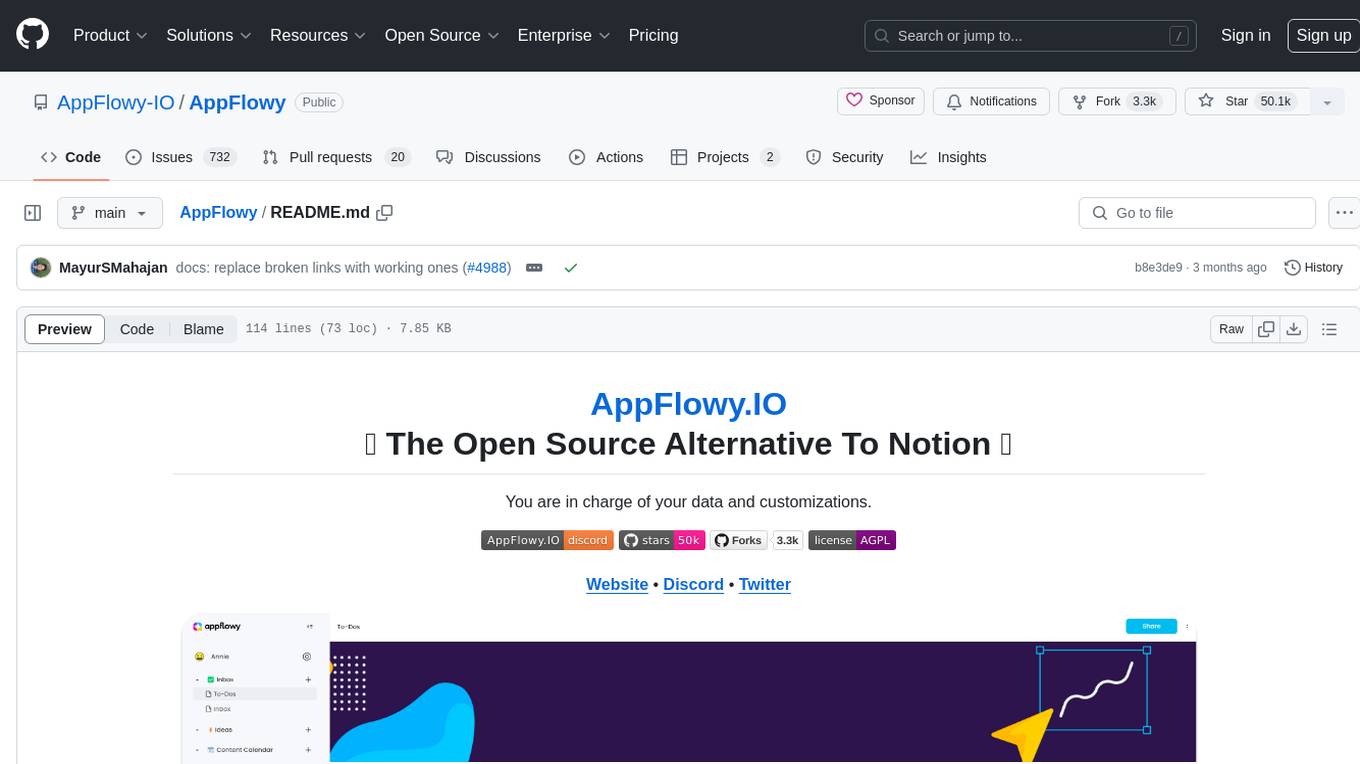
AppFlowy
AppFlowy.IO is an open-source alternative to Notion, providing users with control over their data and customizations. It aims to offer functionality, data security, and cross-platform native experience to individuals, as well as building blocks and collaboration infra services to enterprises and hackers. The tool is built with Flutter and Rust, supporting multiple platforms and emphasizing long-term maintainability. AppFlowy prioritizes data privacy, reliable native experience, and community-driven extensibility, aiming to democratize the creation of complex workplace management tools.
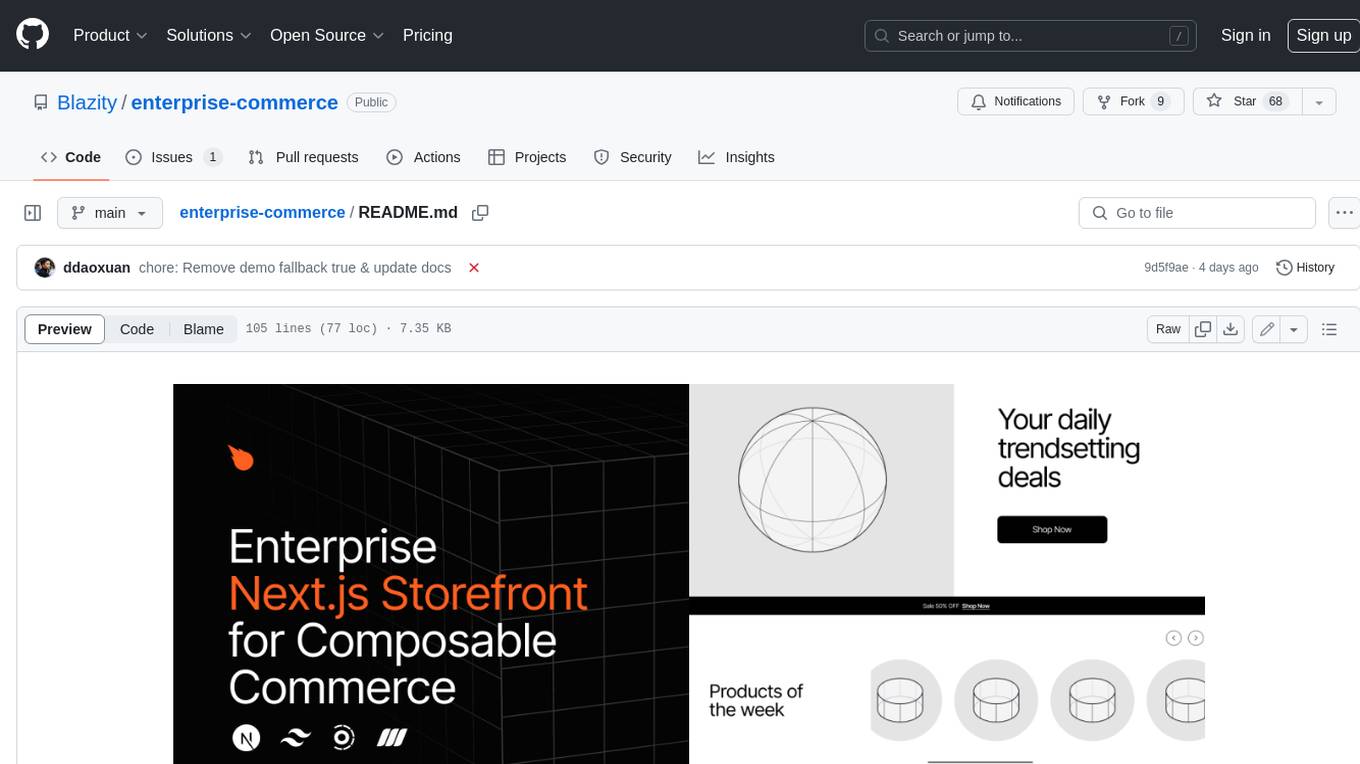
enterprise-commerce
Enterprise Commerce is a Next.js commerce starter that helps you launch your high-performance Shopify storefront in minutes, not weeks. It leverages the power of Vector Search and AI to deliver a superior online shopping experience without the development headaches.

CodeProject.AI-Server
CodeProject.AI Server is a standalone, self-hosted, fast, free, and open-source Artificial Intelligence microserver designed for any platform and language. It can be installed locally without the need for off-device or out-of-network data transfer, providing an easy-to-use solution for developers interested in AI programming. The server includes a HTTP REST API server, backend analysis services, and the source code, enabling users to perform various AI tasks locally without relying on external services or cloud computing. Current capabilities include object detection, face detection, scene recognition, sentiment analysis, and more, with ongoing feature expansions planned. The project aims to promote AI development, simplify AI implementation, focus on core use-cases, and leverage the expertise of the developer community.

tracecat
Tracecat is an open-source automation platform for security teams. It's designed to be simple but powerful, with a focus on AI features and a practitioner-obsessed UI/UX. Tracecat can be used to automate a variety of tasks, including phishing email investigation, evidence collection, and remediation plan generation.
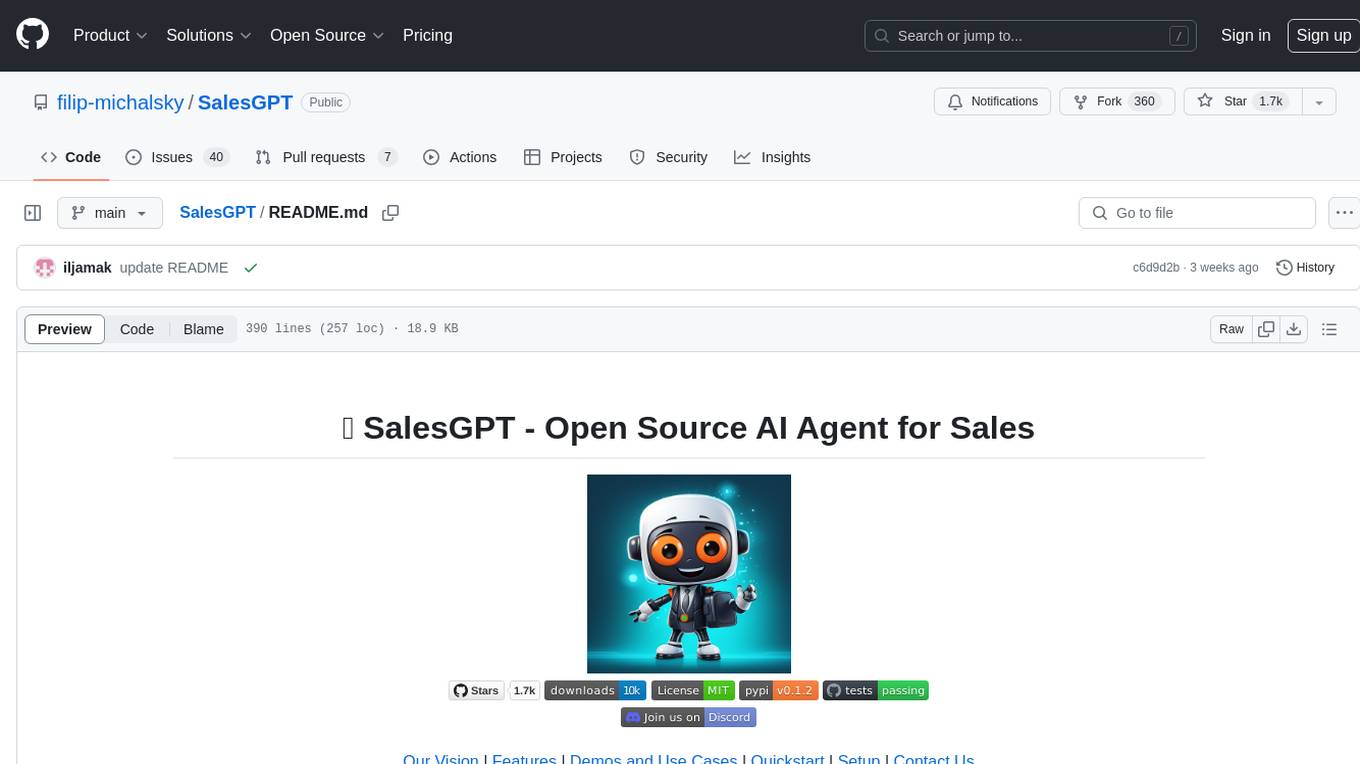
SalesGPT
SalesGPT is an open-source AI agent designed for sales, utilizing context-awareness and LLMs to work across various communication channels like voice, email, and texting. It aims to enhance sales conversations by understanding the stage of the conversation and providing tools like product knowledge base to reduce errors. The agent can autonomously generate payment links, handle objections, and close sales. It also offers features like automated email communication, meeting scheduling, and integration with various LLMs for customization. SalesGPT is optimized for low latency in voice channels and ensures human supervision where necessary. The tool provides enterprise-grade security and supports LangSmith tracing for monitoring and evaluation of intelligent agents built on LLM frameworks.

danswer
Danswer is an open-source Gen-AI Chat and Unified Search tool that connects to your company's docs, apps, and people. It provides a Chat interface and plugs into any LLM of your choice. Danswer can be deployed anywhere and for any scale - on a laptop, on-premise, or to cloud. Since you own the deployment, your user data and chats are fully in your own control. Danswer is MIT licensed and designed to be modular and easily extensible. The system also comes fully ready for production usage with user authentication, role management (admin/basic users), chat persistence, and a UI for configuring Personas (AI Assistants) and their Prompts. Danswer also serves as a Unified Search across all common workplace tools such as Slack, Google Drive, Confluence, etc. By combining LLMs and team specific knowledge, Danswer becomes a subject matter expert for the team. Imagine ChatGPT if it had access to your team's unique knowledge! It enables questions such as "A customer wants feature X, is this already supported?" or "Where's the pull request for feature Y?"

OpenDAN-Personal-AI-OS
OpenDAN is an open source Personal AI OS that consolidates various AI modules for personal use. It empowers users to create powerful AI agents like assistants, tutors, and companions. The OS allows agents to collaborate, integrate with services, and control smart devices. OpenDAN offers features like rapid installation, AI agent customization, connectivity via Telegram/Email, building a local knowledge base, distributed AI computing, and more. It aims to simplify life by putting AI in users' hands. The project is in early stages with ongoing development and future plans for user and kernel mode separation, home IoT device control, and an official OpenDAN SDK release.
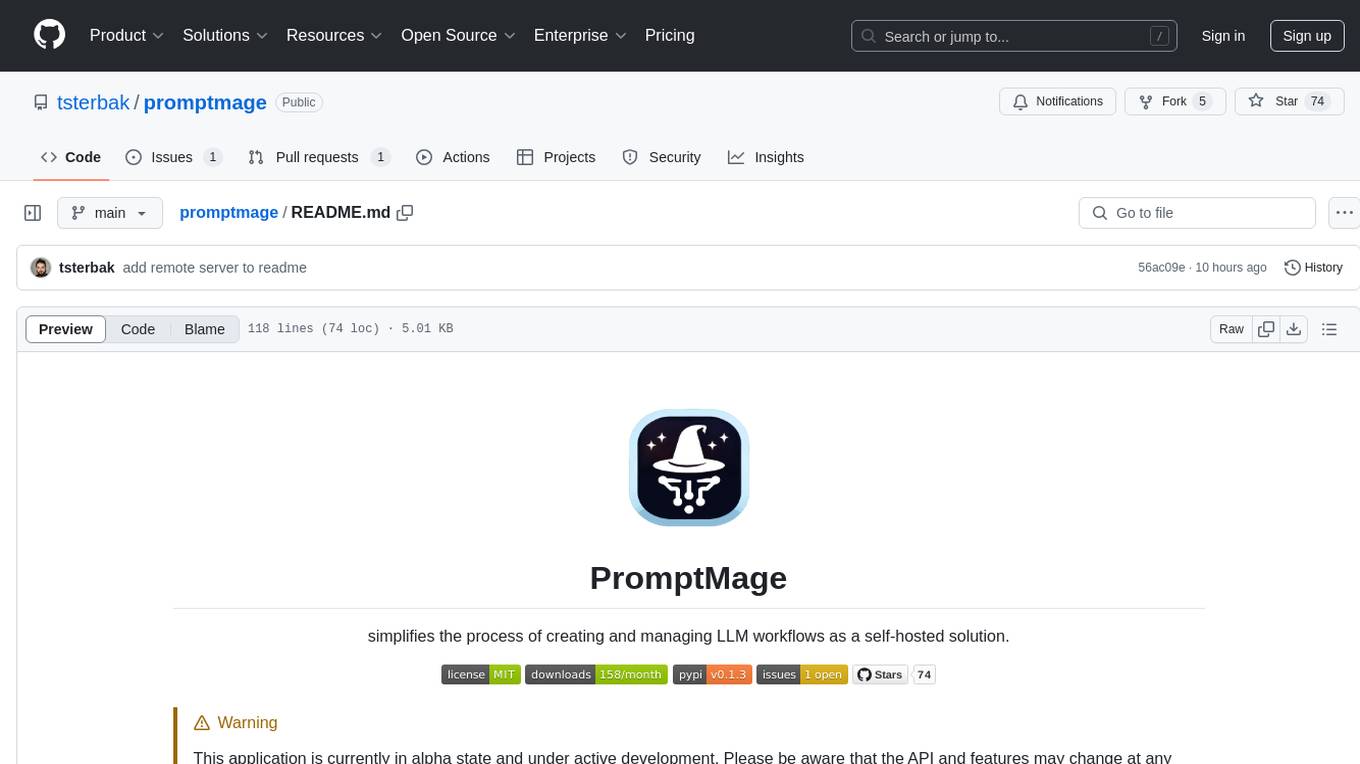
promptmage
PromptMage simplifies the process of creating and managing LLM workflows as a self-hosted solution. It offers an intuitive interface for prompt testing and comparison, incorporates version control features, and aims to improve productivity in both small teams and large enterprises. The tool bridges the gap in LLM workflow management, empowering developers, researchers, and organizations to make LLM technology more accessible and manageable for the next wave of AI innovations.
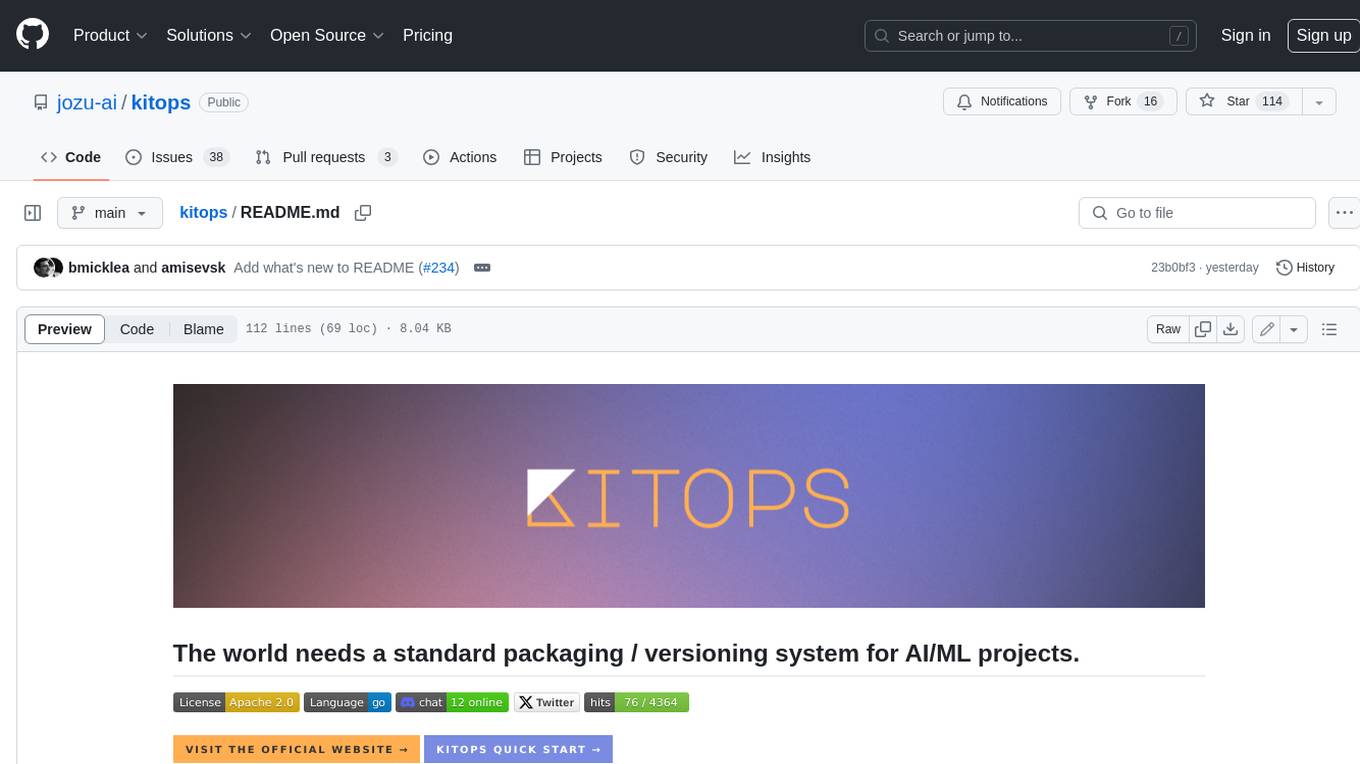
kitops
KitOps is a packaging and versioning system for AI/ML projects that uses open standards so it works with the AI/ML, development, and DevOps tools you are already using. KitOps simplifies the handoffs between data scientists, application developers, and SREs working with LLMs and other AI/ML models. KitOps' ModelKits are a standards-based package for models, their dependencies, configurations, and codebases. ModelKits are portable, reproducible, and work with the tools you already use.
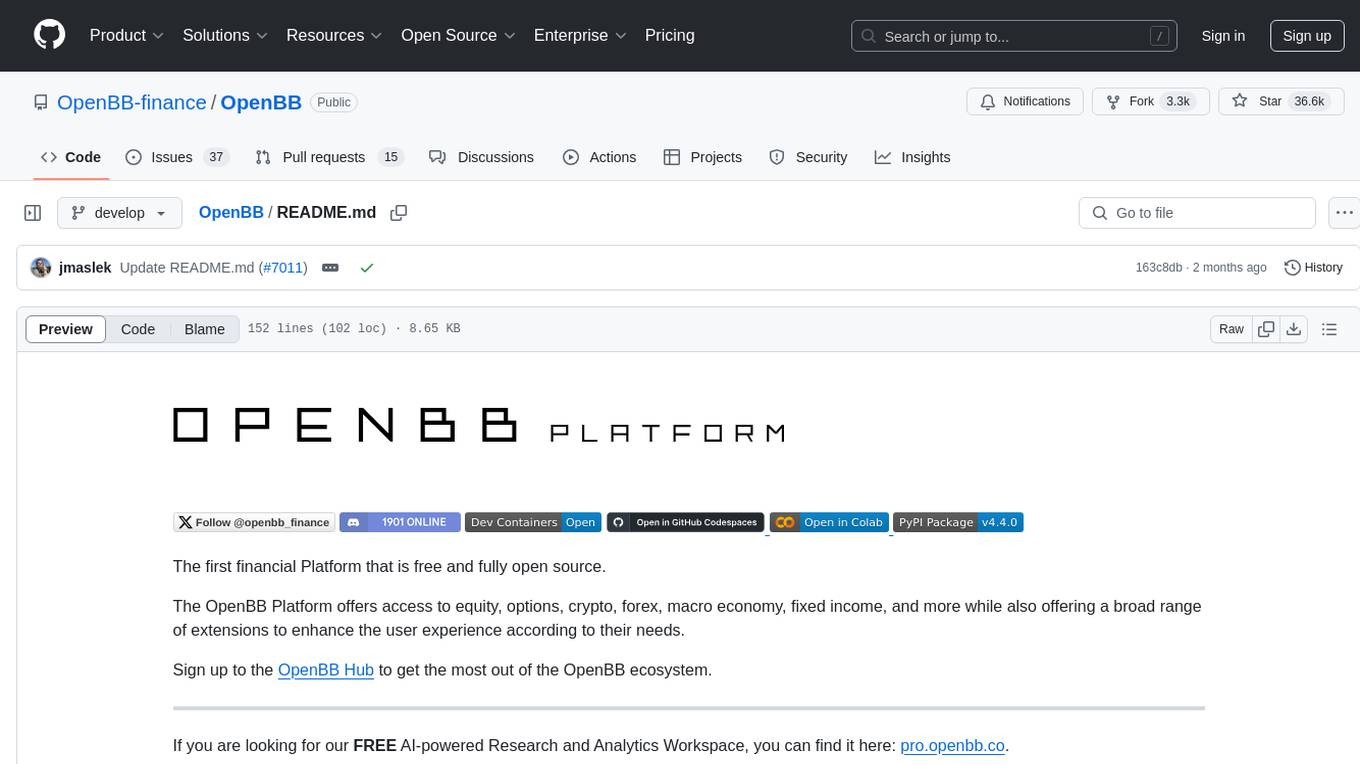
OpenBB
The OpenBB Platform is the first financial platform that is free and fully open source, offering access to equity, options, crypto, forex, macro economy, fixed income, and more. It provides a broad range of extensions to enhance the user experience according to their needs. Users can sign up to the OpenBB Hub to maximize the benefits of the OpenBB ecosystem. Additionally, the platform includes an AI-powered Research and Analytics Workspace for free. There is also an open source AI financial analyst agent available that can access all the data within OpenBB.
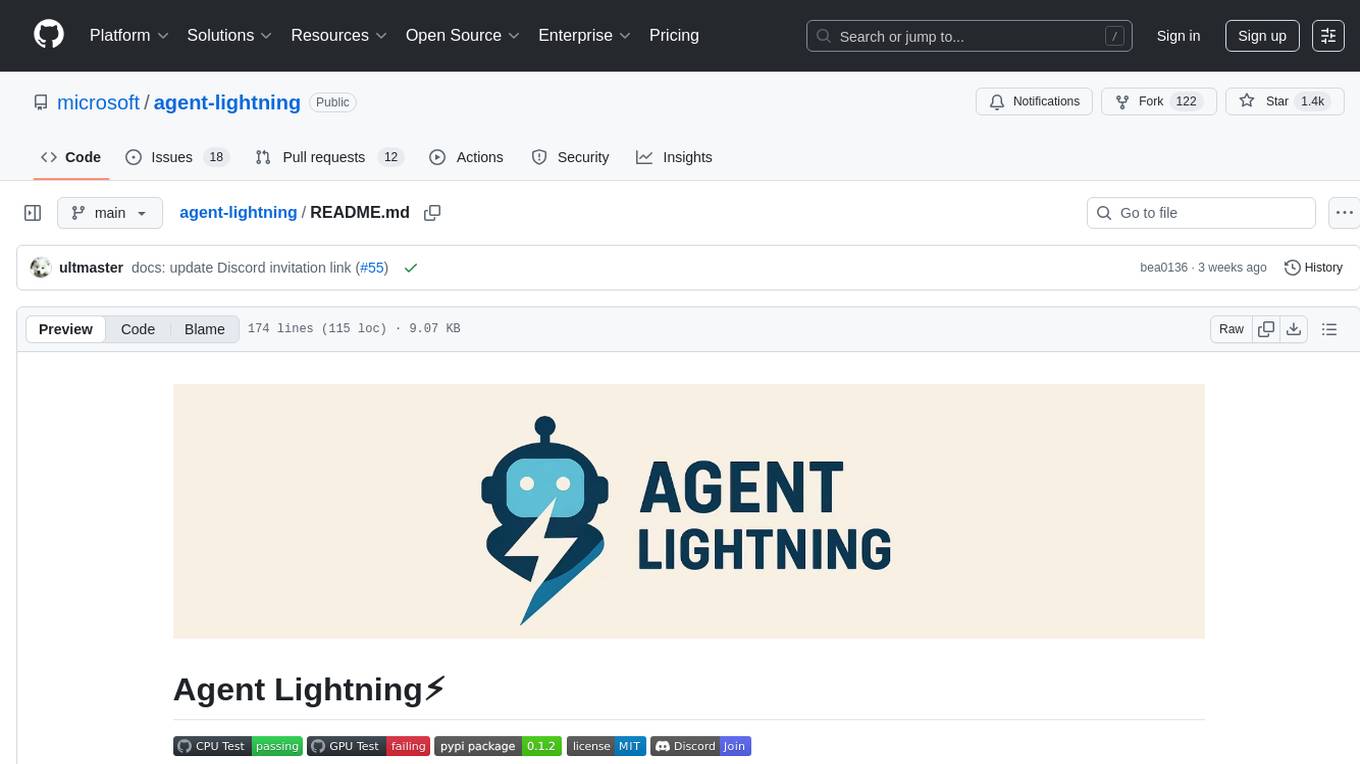
agent-lightning
Agent Lightning is a lightweight and efficient tool for automating repetitive tasks in the field of data analysis and machine learning. It provides a user-friendly interface to create and manage automated workflows, allowing users to easily schedule and execute data processing, model training, and evaluation tasks. With its intuitive design and powerful features, Agent Lightning streamlines the process of building and deploying machine learning models, making it ideal for data scientists, machine learning engineers, and AI enthusiasts looking to boost their productivity and efficiency in their projects.
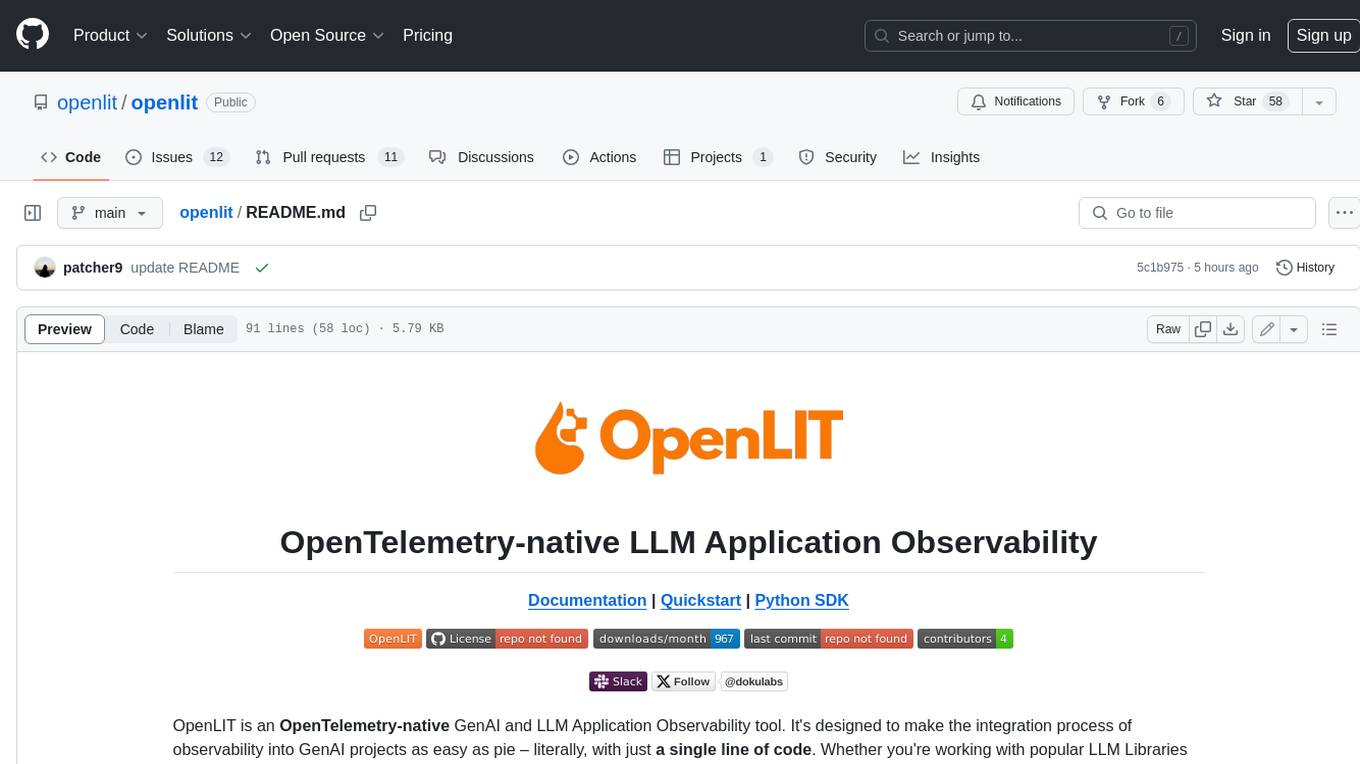
doku
OpenLIT is an OpenTelemetry-native GenAI and LLM Application Observability tool. It's designed to make the integration process of observability into GenAI projects as easy as pie – literally, with just a single line of code. Whether you're working with popular LLM Libraries such as OpenAI and HuggingFace or leveraging vector databases like ChromaDB, OpenLIT ensures your applications are monitored seamlessly, providing critical insights to improve performance and reliability.

airbyte
Airbyte is an open-source data integration platform that makes it easy to move data from any source to any destination. With Airbyte, you can build and manage data pipelines without writing any code. Airbyte provides a library of pre-built connectors that make it easy to connect to popular data sources and destinations. You can also create your own connectors using Airbyte's no-code Connector Builder or low-code CDK. Airbyte is used by data engineers and analysts at companies of all sizes to build and manage their data pipelines.
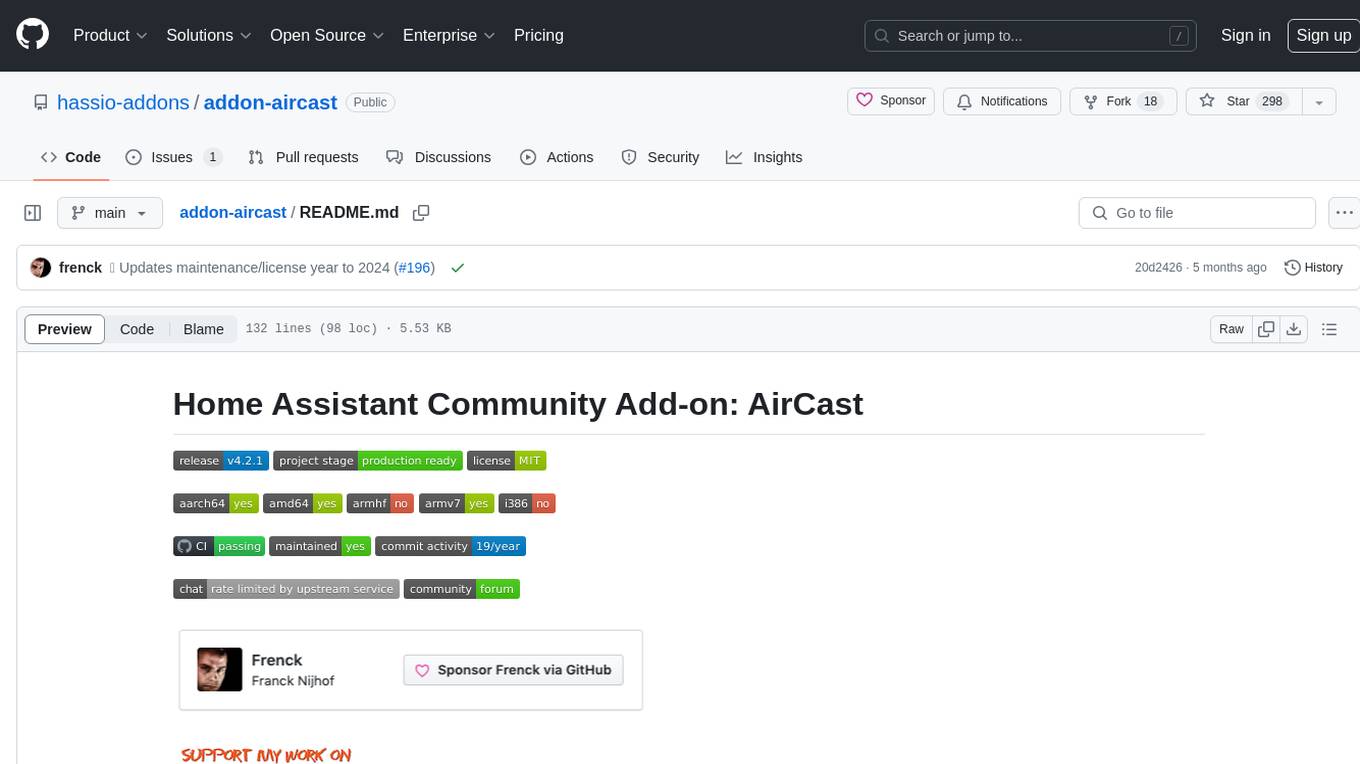
addon-aircast
AirCast is a Home Assistant Community Add-on that provides AirPlay capabilities for Chromecast players. It bridges the compatibility gap between Apple's AirPlay and Google's Chromecast by creating virtual AirPlay devices for Chromecast players on the network. The add-on is based on the AirConnect project and allows users to stream audio from Apple devices to Chromecast players.
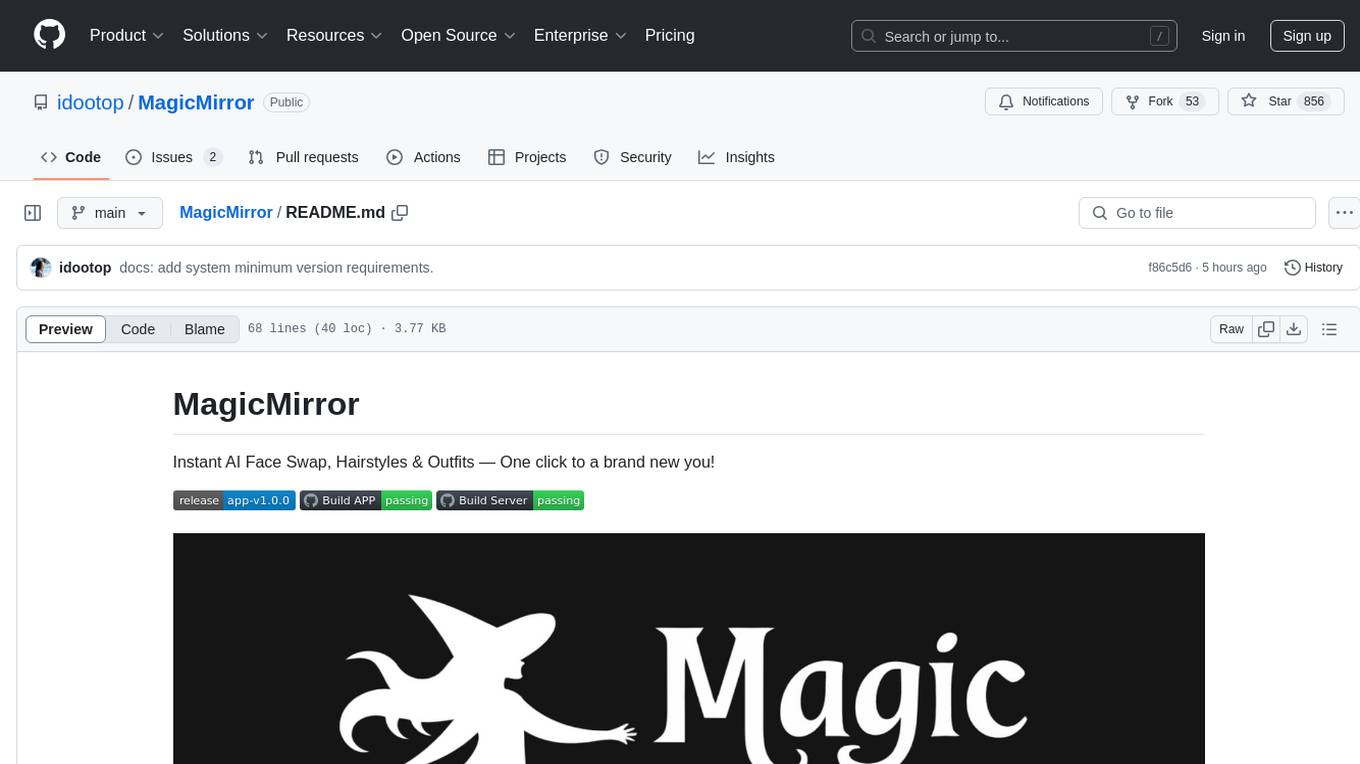
MagicMirror
MagicMirror is an AI-powered tool that allows users to instantly try on new faces, hairstyles, and outfits with a simple drag and drop interface. It runs smoothly on standard computers without the need for dedicated GPU hardware, ensuring privacy with completely offline processing. The tool is ultra-lightweight with a small installer size and model files, providing a fun and easy way to experiment with different looks.
For similar tasks

AeonLabs-AI-Volvo-MKII-Open-Hardware
This open hardware project aims to extend the life of Volvo P2 platform vehicles by updating them to current EU safety and emission standards. It involves designing and prototyping OEM hardware electronics that can replace existing electronics in these vehicles, using the existing wiring and without requiring reverse engineering or modifications. The project focuses on serviceability, maintenance, repairability, and personal ownership safety, and explores the advantages of using open solutions compared to conventional hardware electronics solutions.
For similar jobs

AeonLabs-AI-Volvo-MKII-Open-Hardware
This open hardware project aims to extend the life of Volvo P2 platform vehicles by updating them to current EU safety and emission standards. It involves designing and prototyping OEM hardware electronics that can replace existing electronics in these vehicles, using the existing wiring and without requiring reverse engineering or modifications. The project focuses on serviceability, maintenance, repairability, and personal ownership safety, and explores the advantages of using open solutions compared to conventional hardware electronics solutions.
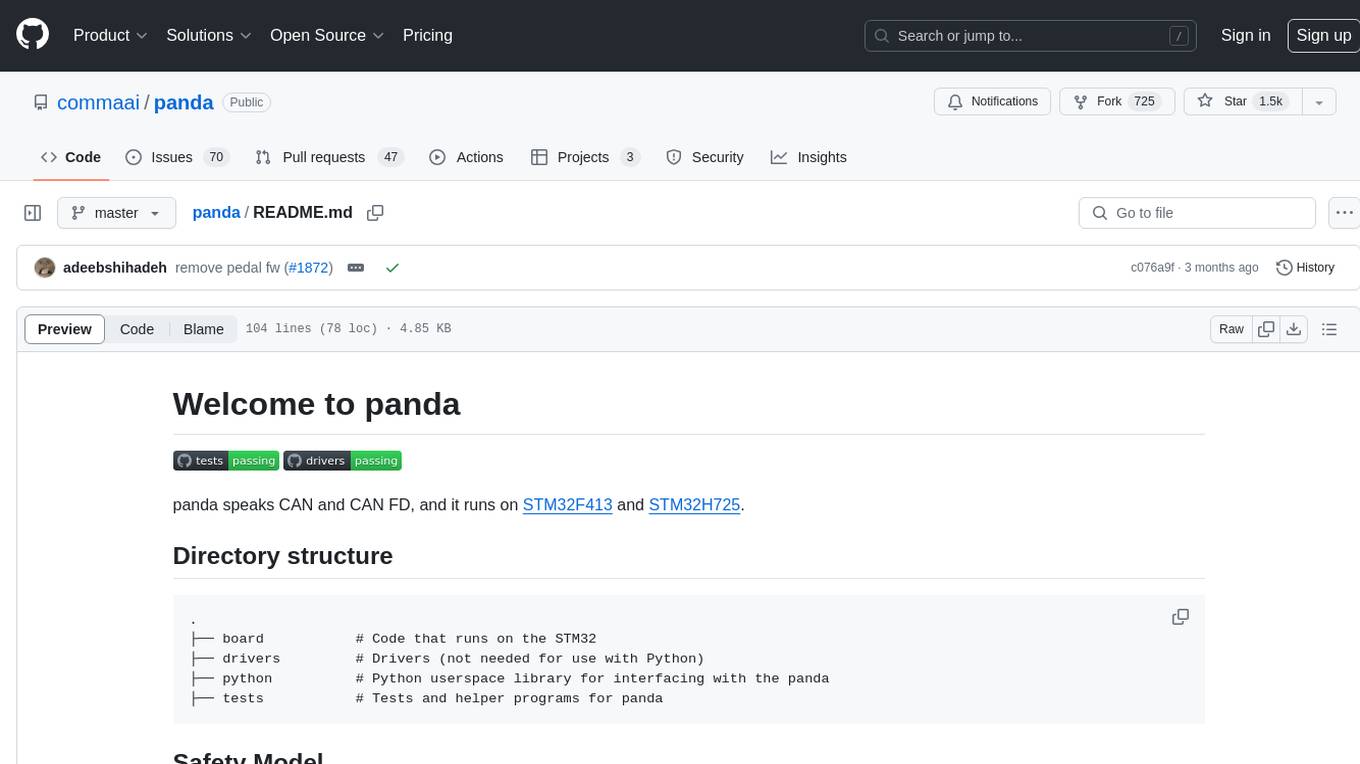
panda
Panda is a car interface tool that speaks CAN and CAN FD, running on STM32F413 and STM32H725. It provides safety modes and controls_allowed feature for message handling. The tool ensures code rigor through CI regression tests, including static code analysis, MISRA C:2012 violations check, unit tests, and hardware-in-the-loop tests. The software interface supports Python library, C++ library, and socketcan in kernel. Panda is licensed under the MIT license.

Lecture_AI_in_Automotive_Technology
This Github repository contains practice session materials for the TUM course on Artificial Intelligence in Automotive Technology. It includes coding examples used in the lectures to teach the foundations of AI in automotive technology. The repository aims to provide hands-on experience and practical knowledge in applying AI concepts to the automotive industry.
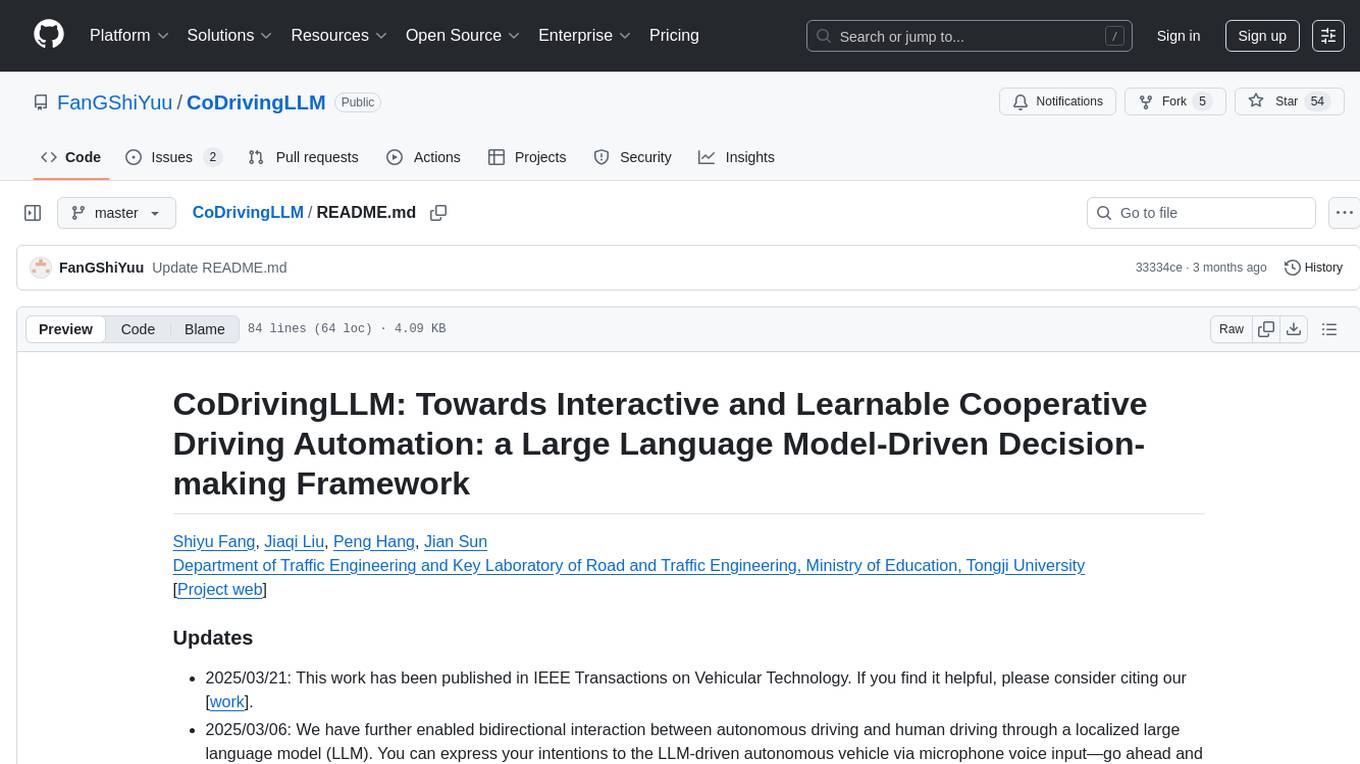
CoDrivingLLM
CoDrivingLLM is a machine learning model for predicting driving behavior based on sensor data collected from vehicles. It utilizes a Long Short-Term Memory (LSTM) neural network to analyze patterns in the data and make predictions about future driving actions. The model is trained on a large dataset of driving scenarios and can be used to improve driver assistance systems, enhance road safety, and optimize vehicle performance. CoDrivingLLM is designed to be easily integrated into existing automotive systems and can provide real-time feedback to drivers to help them make safer and more efficient driving decisions.
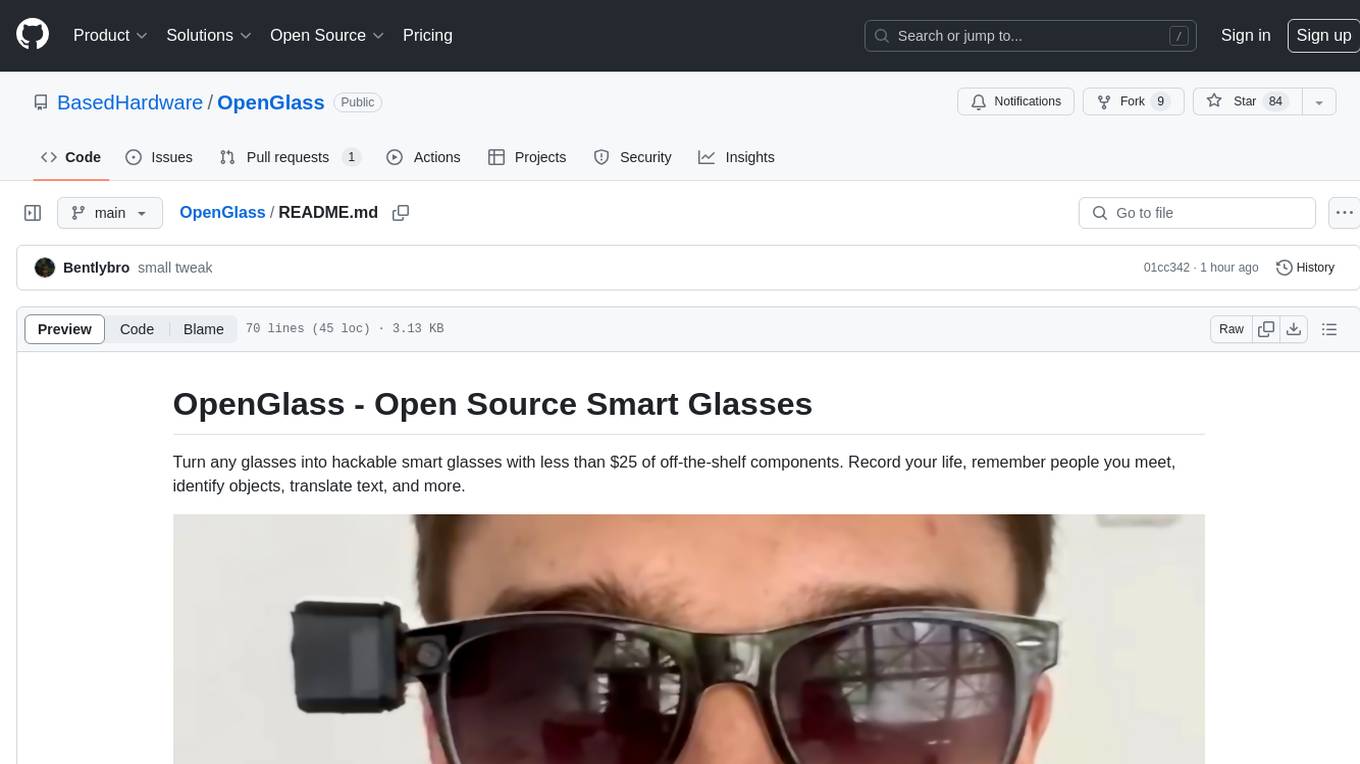
OpenGlass
OpenGlass is an open-source project that allows users to transform any regular glasses into smart glasses using affordable off-the-shelf components. With a cost of less than $25, users can enhance their glasses to record their daily activities, recognize people, identify objects, translate text, and more. The project provides detailed instructions on hardware setup and software installation, making it accessible for DIY enthusiasts and tech enthusiasts alike. By following the steps outlined in the repository, users can create their own smart glasses and explore various functionalities offered by the project.
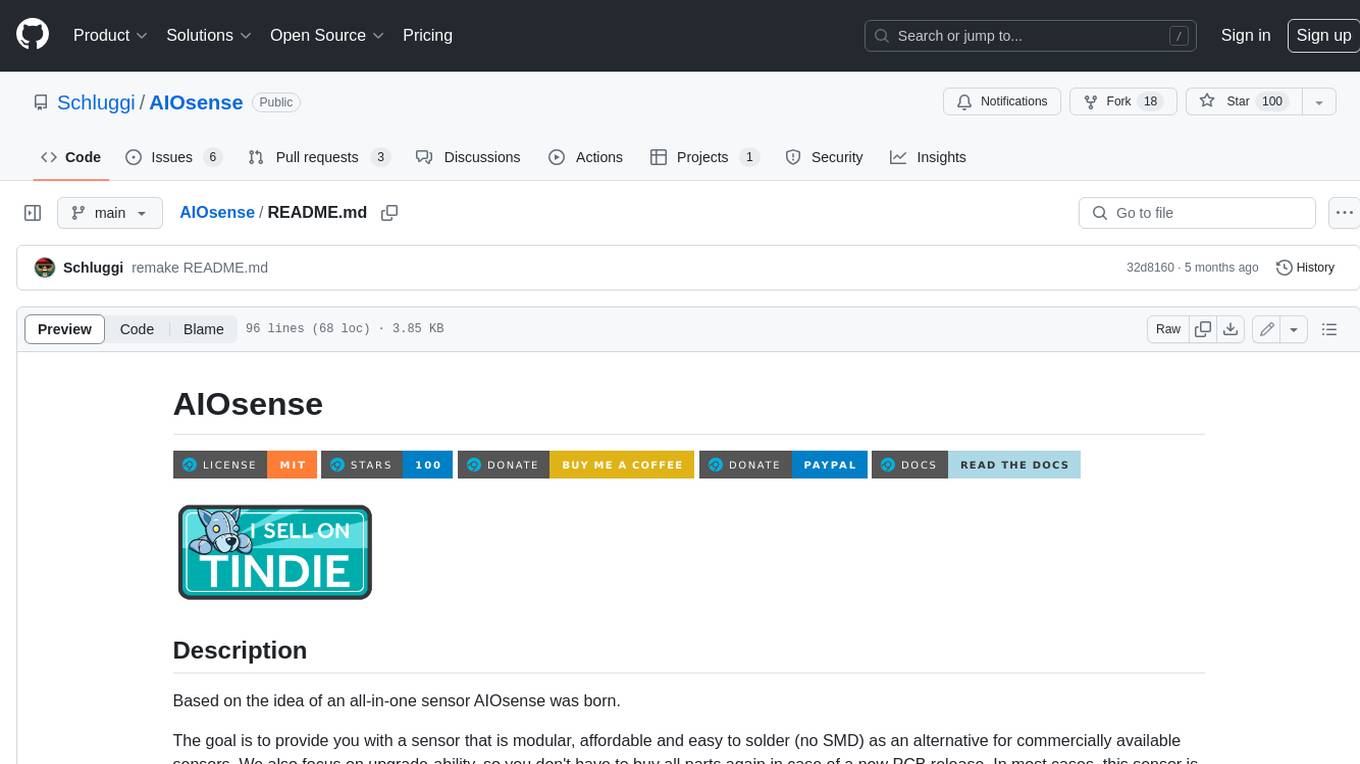
AIOsense
AIOsense is an all-in-one sensor that is modular, affordable, and easy to solder. It is designed to be an alternative to commercially available sensors and focuses on upgradeability. AIOsense is cheaper and better than most commercial sensors and supports a variety of sensors and modules, including: - (RGB)-LED - Barometer - Breath VOC equivalent - Buzzer / Beeper - CO² equivalent - Humidity sensor - Light / Illumination sensor - PIR motion sensor - Temperature sensor - mmWave / Radar sensor Upcoming features include full voice assistant support, microphone, and speaker. All supported sensors & modules are listed in the documentation. AIOsense has a low power consumption, with an idle power consumption of 0.45W / 0.09A on a fully equipped board. Without a mmWave sensor, the idle power consumption is around 0.11W / 0.02A. To get started with AIOsense, you can refer to the documentation. If you have any questions, you can open an issue.
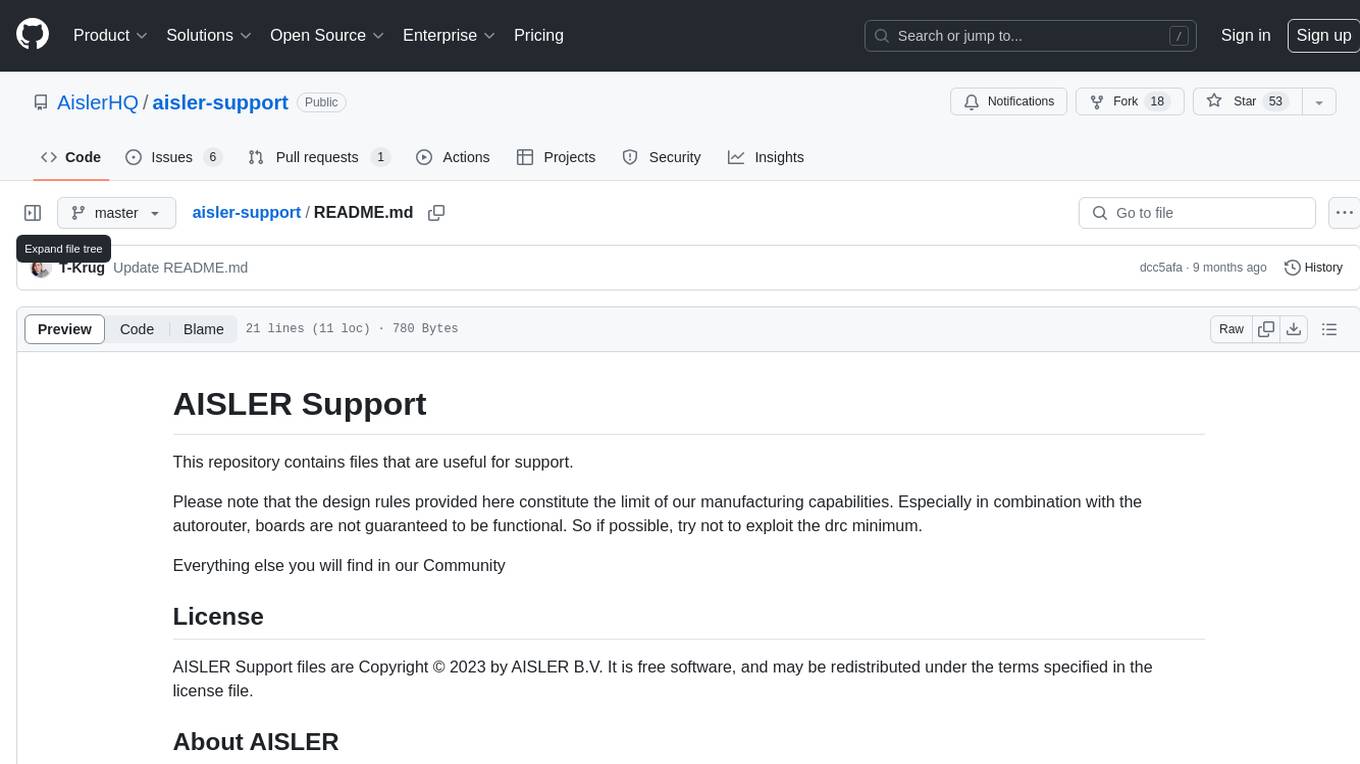
aisler-support
AISLER Support repository contains files useful for support. Design rules provided here limit manufacturing capabilities. Boards may not be functional with autorouter. Explore more in Community. AISLER Support files are Copyright © 2023 by AISLER B.V. Free software under specified license terms. Visit AISLER for industry quality and affordable PCBs.
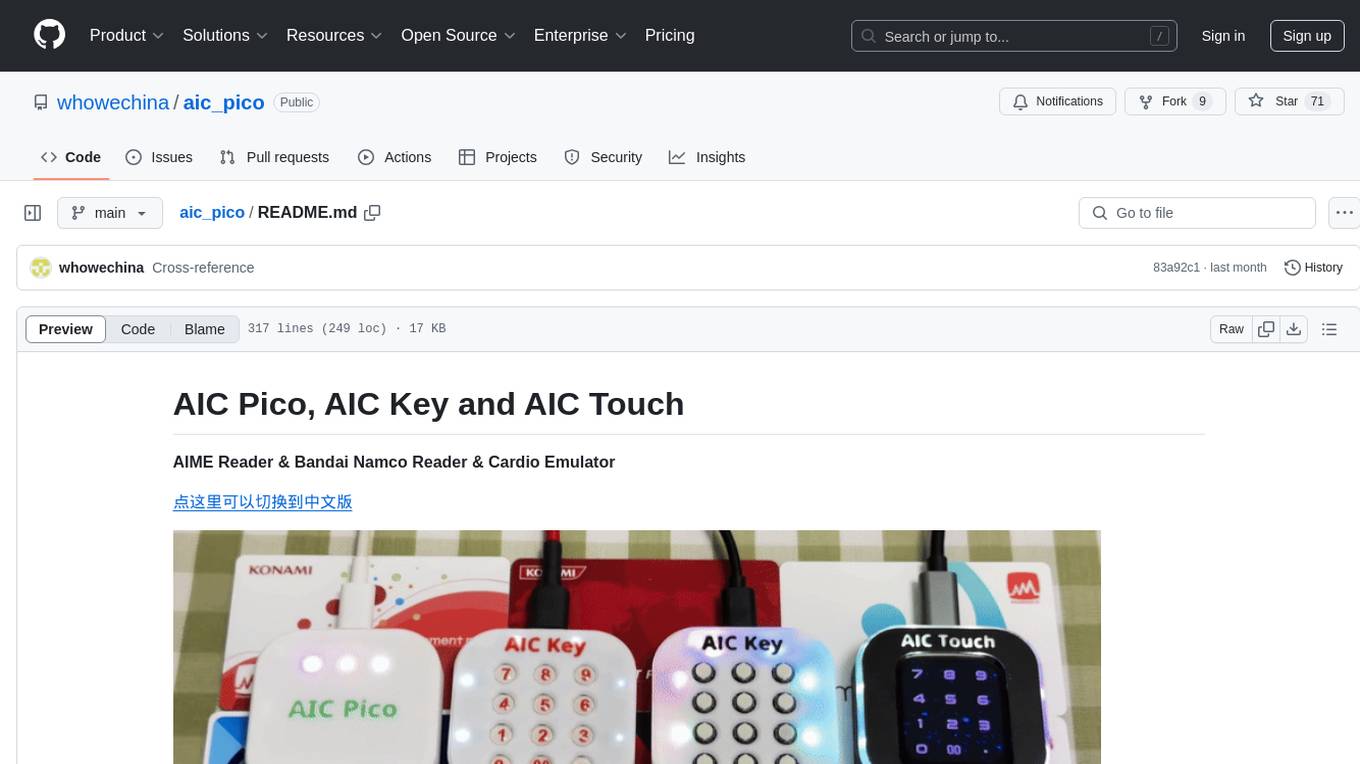
aic_pico
AIC Pico is a small and versatile tool designed for emulating various I/O protocols such as Sega AIME I/O, Bandai Namco I/O, and Spicetools CardIO. It supports card types like FeliCa, ISO/IEC 14443 Type A, and ISO/IEC 15693, allowing users to create virtual AIC from Mifare cards. The tool is open-source and easy to integrate into Raspberry Pi Pico projects. It requires skills in 3D printing and soldering tiny components. AIC Pico comes in different variants like PN532, PN5180, AIC Key, and AIC Touch, each with specific assembly instructions and components. The firmware can be updated via UF2 files and offers command line configurations for LED control, brightness adjustment, card detection, and more.
















